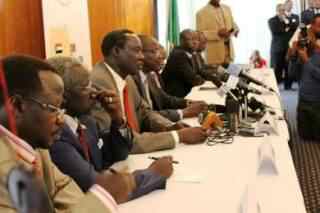Former S. Sudan political detainees unveil program for reform
August 15, 2014 (JUBA) – A group of former South Sudanese political detainees, most of whom were senior members of the governing Sudan People’s Liberation Movement (SPLM), have outlined a series of reforms aimed at addressing a number of issues the country has been grappling with since its secession from Sudan in 2011.

According to the document extended to Sudan Tribune, the group aims to establish a federal and democratic system of governance reflective of the country’s true composition.
It says the adoption of comprehensive reform programs would help to guarantee better governance, adherences to rule of law, human rights, gender equality and affirmative action, as well as the transformation of economic, political and social sectors.
“We shall work towards the realisation of building a federal democratic and prosperous homeland for all our people based on justice, equality, respect for diversity, human rights and dignity, constitutionalism and the rule of law,” the document reads in part.
The groups said the current system of decentralisation would also be reviewed in light of current demands for a federal system of government.
This will entail changes to the current administrative organisation of the country and more devolution of powers to the states and local government, with a view to creating more states to ensure the government is taken closer to the people.
In the document the group also expresses a desire to carry out significant reforms to enhance transparency in the oil sector, as well as outlining plans to diversify the economy so that it moves away from the dependence on oil revenues.
“We shall encourage exports, especially in the forest and farm products, livestock, fisheries and raw materials in order to diversify the economy from over-reliance on oil revenues and realise more potential in generating comparative advantage in other areas of the economy,” the document adds.
The group has pledged to promote people’s participation in the governance of the country through democratic, free and fair elections, as well as the devolution and exercise of power.
Other areas covered in the 12 reform programs include plans to establish a national commission for reconciliation and healing, building a democratic federal state and developing an efficacious strategy for transforming the security sector and boosting the country’s resilience.
It expressed commitment to full separation and containment of the forces of the warring parties after which disarmament, demobilisation and reintegration programs would be implemented.
The reform programs will extend to revitalising external relations, debt management, promotion of private sector development and investment, curbing corruption and petroleum and natural resource management.
Management of land and Nile water flows have also been covered, as well as agriculture, livestock, fisheries, wildlife and tourism and environmental protection have also been covered.
Significant attention will be given to institutional reforms favourable to social policy, particularly around education, health, women, youth and people with special needs.
Priority is also given to the building of physical infrastructure, including energy, roads, airports and sanitation, as well as civil service reforms at national and state levels.
The document also recognises the need for a comprehensive constitutional review, census and elections.
It is the group’s view that the current national crisis can only be comprehensively resolved through inclusive, multi-stakeholder dialogue involving both warring parties, SPLM leaders (FPD), political parties, civil society representatives and faith-based groups.
This is important in order to ensure the ownership of the peace agreement by all South Sudanese and guarantee its sustainability, the former detainees said.
It is also noted that under the previous administration the civil service structure was limited in scope and functions.
“It was militarised to some degree as the civil servants were subjected to military training in preparation for combat functions. It was understaffed, disorganised and its traditional values and impartiality were greatly compromised,” the document said.
The proposed reform programs have drawn significant attention from the government and the members of the general public, although it remains unclear how they would be rolled out.
(ST)
